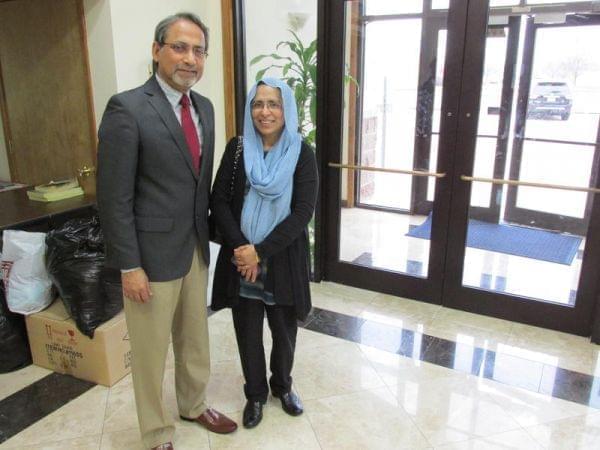Being Muslim In Illinois

Baker Siddique and wife Nazmun Rachel Otwell/WUIS
Muslims in Illinois are coping with increased scrutiny and incendiary rhetoric. We take you inside a local mosque and introduce you to a business owner in Champaign-Urbana.
It's Friday afternoon at the Islamic Society of Greater Springfield. The building is nondescript save for its copper colored dome. It's tucked away from a main road, nestled in a cluster of small businesses. The local Imam is leading a call to prayer.
I take off my shoes and head to a carpeted room. About thirty women and children sit on the floor. The women have scarves covering their hair and skirts that go down to their ankles. There's an inside wall with windows that allow a view into the main room where a far greater number of men are sitting.
Springfield resident and economics professor Baker Siddique is one of them. He says he knows what it's like to be victimized by radical Muslims. He grew up during a time of genocide and civil war, fighting for Bangladesh's independence from Pakistan. It's estimated up to 3 million people were killed, and thousands others raped and tortured during the1971 Bangladesh Liberation War.
"The war was a very difficult experience for us. I've seen a lot of killings and destruction," Siddique says. Winning independence had repercussions. Some of Siddique's brothers went into hiding for fear of backlash from the extremists they had fought against.
After obtaining a college degree, Siddique moved to Canada to pursue more education. Numerous times while living there he was shouted at with racial slurs, even spit on. "You can say that I got used to it in some sense."
In 1987 he and his wife moved to Springfield so he could work at what was then called Sangamon State University. He says it was virtually impossible to find a landlord who would rent to him: "We'd call and someone would say, 'Yeah, we have an apartment.' But as soon as the person would see my face, they'd say, 'Oh. It's taken.'" Siddique says up until the mid-90s he'd hear people shout racial slurs and yell for him to "go home", even in the presence of his small children.
Siddique calls himself simply "Muslim." Technically he is Sunni, as are about 9 out of 10 Muslims in the world. He says his religion is peaceful. From his point of view, no terrorist would be able to accurately identify as one.
Siddique prays five times a day and regularly attends mosque. Today, Imam Hassan Mohammad's sermon is about fear - and how to combat it by living openly with one's faith: "More than ever before people feel insecure, they are afraid for their families, for their lives, for their businesses." Mohammad especially urges the women not to be afraid to wear their hi-jabs in public, the scarves that cover their heads.
Maryam Mostoufi has been a Muslim chaplain for two decades and has a doctorate in ministry. She was raised as a Christian but says this tradition called to her early in life. "I love the idea that every act you engage in has the potential for being an act of worship." When she moved to Springfield in the eighties she says the Muslim community consisted of a dozen families - now there are around 300 from an array of ethnicities.
She says today's sermon resonated, especially as a Muslim woman. "Because of the way in which we dress, we are easily identified and we can be targets. We can be spit at, have names called, have things thrown at us. Usually those are crimes of opportunity."
Discrimination of Muslims is, of course, nothing new. The Springfield Islamic Society's previous mosque was set on fire in the wake of a terrorist attack on American soil.
Interestingly, it wasn't September 11. It was after Timothy McVeigh bombed the federal building in Oklahoma City in 1995, killing more than 150 people. Immediately following the attack, media speculation blamed Muslim terrorists, inciting an intense wave of Islamophobia. However, the response after the attack on the World Trade Center in 2001 was a complete 180-degree turn, Baker Siddique says. As he explains, following the attacks, non-Muslim Springfield residents surrounded the mosque holding hands, to protect those inside as they worshipped.
Siddique says, "That was something really American."
Siddique says he understands why people these days are increasingly vigilant regarding Muslims. He doesn't consider someone a bigot for questioning the presence of Muslims in our country. But he says the current political rhetoric, especially from presidential candidates is scary and irresponsible. It creates an environment of paranoia and fear, which he feels can lead to violence toward more innocent people.
He could be right. The FBI says the number of hate crimes targeting American Muslims -- including murder -- increased last year by 14 percent. Some experts say that number is likely to increase this year.
Siddique's wife, who wears the hi-jab, has taken a break from substitute teaching, for fear of how students might treat her. For now, he says, the best they can do is continue going about their daily routines as much as possible: "We're not just withdrawing from life. Because in general, this is the best place for us to practice our religion and to live that American dream."
